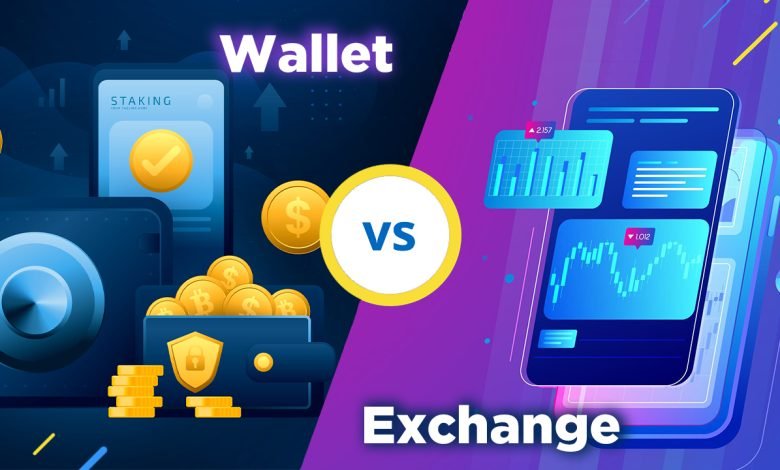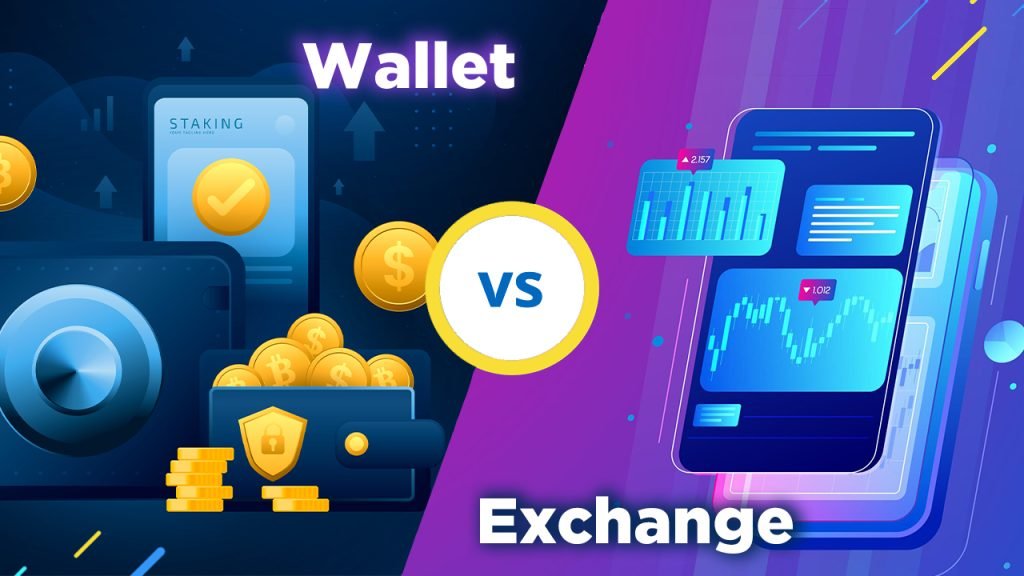How Safe Is a Wallet Compared to an Exchange?

With over 6,000 cryptocurrency assets available for exploration and investment, cryptocurrency is growing in popularity every day. As you begin trading cryptocurrencies, you must take into account a number of crypto-related ideas, one of which is knowing the differences between cryptocurrency wallets and exchanges.
Exploring Cryptocurrency Exchanges
Online marketplaces known as cryptocurrency exchanges allow users to purchase, sell, and trade different cryptocurrencies. They serve as go-betweens, connecting buyers and sellers and offering a safe setting for business dealings. In general, exchanges can be divided into two groups:
1. Features like fiat-to-crypto trading, high liquidity, and customer service are provided by centralized exchanges (CEX), which are run by a central authority. Coinbase, Binance, and Kraken are a few examples. Users do not, however, possess private keys, therefore security depends on the exchange.
2. Direct peer-to-peer trading is possible on decentralized exchanges (DEX), which function without a central authority. PancakeSwap and Uniswap are two examples. DEXs may have less liquidity and no customer service, but they do give more privacy and control over money.
3. When selecting an exchange, consumers should take security, fees, and platform features into account. Exchanges offer a convenient way to trade and invest in cryptocurrencies. Many users move money from exchanges to personal wallets for long-term storage in order to increase security.

1. What is the least secure wallet?
A hot wallet offered by an online platform, particularly exchange-hosted wallets, is typically regarded as the least secure kind of wallet. This is the reason:
- Custodial Nature: Users do not have direct control over their money in exchange-hosted wallets because the platform retains the private keys. Users become dependent on the platform’s security as a result.
- Internet Connectivity: Compared to offline (cold) wallets, hot wallets are more susceptible to hacking and cyberattacks when they are online.
- Centralized Targets: Because of the vast quantities of assets they contain, hackers frequently target centralized platforms and hot wallets.
On the other hand, offline and non-custodial wallets—like paper or hardware wallets—are typically more secure, particularly when used for extended periods of time.
2. Crypto Wallet vs. Crypto Exchange: Key Differences
A crypto wallet and a crypto exchange serve different purposes in the cryptocurrency ecosystem. A crypto wallet securely stores digital assets and gives users control over their private keys, making it ideal for long-term storage.
In contrast, a crypto exchange is a platform for buying, selling, and trading cryptocurrencies, offering convenience for active trading but requiring users to trust the platform with their assets since the exchange holds the private keys.
Overall, wallets prioritize security, while exchanges prioritize trading efficiency.
3. Which Indian crypto exchange is safe?
WazirX: One of the largest and most popular exchanges in India, WazirX offers strong security measures, including two-factor authentication (2FA) and withdrawal whitelist features. It is also backed by Binance, a global crypto exchange.
CoinDCX: Known for its extensive range of cryptocurrencies and advanced trading features, CoinDCX prioritizes user security with 2FA and cold storage for assets. They also have a robust compliance framework.
ZebPay: This exchange has been operating since 2014 and has a solid reputation for security. ZebPay employs stringent security measures, including 2FA, biometric verification, and cold storage.
Unocoin: Primarily focused on Bitcoin, Unocoin offers a secure platform for buying and selling Bitcoin with added features like systematic investment plans (SIPs) in Bitcoin. They prioritize user security and compliance.
Koinex: Koinex provides a user-friendly interface and a range of trading options while implementing strong security protocols, including 2FA and cold storage.
4. How to Stay Safe with Cryptocurrency Exchanges ?
Although cryptocurrency exchanges provide a practical means of purchasing, selling, and trading digital assets, security must always come first in order to safeguard your money. Here are some essential safety tips:
Select a Trustworthy Exchange
Security Features: Seek out exchangers that place a high priority on security protocols such as encryption, two-factor authentication (2FA), and frequent security audits.
Regulatory Compliance: Choose exchanges that are subject to respectable regulatory oversight.
User Reviews: To determine the repute of the exchange, read user reviews and testimonials.
Strong Security Procedures and Passwords
Distinct Passwords: Make sure your exchange account passwords are strong and distinct.
Turn on 2FA to give your account an additional degree of protection.
Keep an eye out for phishing attacks: Watch out for dubious emails, links, or anything that could allow unwanted access.
Secure Your gadget Antivirus Software: Use dependable antivirus software to keep your gadget safe.
Firewall: To prevent unwanted access to your device, use a firewall.
Secure Wi-Fi Networks: Steer clear of sensitive transactions over public Wi-Fi.
Conclusion:
In conclusion, compared to exchanges, wallets typically provide a higher level of protection for holding digital assets. By giving users control over their private keys, wallets—especially non-custodial ones—lower the possibility of theft and hacking. On the other hand, exchanges are more susceptible to hacks because they frequently store users’ private keys, despite their convenience for trading. Using a wallet, particularly a hardware wallet, offers a safer alternative for long-term storage. By selecting the appropriate tools and following industry best practices for safety in the cryptocurrency realm, users should place a high priority on protecting their money.
FAQs:
1. What is a wallet for cryptocurrencies?
A digital instrument that lets you transmit, receive, and store cryptocurrency is called a wallet.In essence, it is a digital address that certifies that you are the owner of a particular cryptocurrency.
2. What is a cryptocurrency exchange?
A platform that lets you buy, sell, and trade different cryptocurrencies is called a cryptocurrency exchange. It’s like a stock exchange, but for digital assets.
3. Are wallets totally secure?
Wallets are not risk-free, even though they provide greater security. To improve security, users must put best practices into practice, such as creating strong passwords and turning on two-factor authentication.
4. What kind of wallet is the most secure?
Since hardware wallets keep assets offline and out of the reach of online threats, they are typically regarded as the safest choice for holding cryptocurrency. When used appropriately, both paper and software wallets provide strong security.



